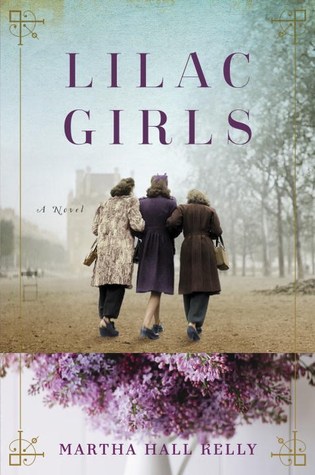Lilac Girls
Martha Hall Kelly
Lilac
Girls is essentially the story about a group of women brought
together by the tragedy of war. Set just before and during World War
II, it follows the story of Caroline Ferriday, a New York socialite,
who worked with the French consulate in New York, helping victims
during the war. It also follows several women from Poland, who end
up in Ravensbrück,
Germany's female only concentration camp. There was also a German
female doctor there who worked at the camp and participating in
medical experiments performed on the women.
While
the book follows the women both before, during and after the war, I
felt like I was reading what could have been two different books. The
story of Caroline Ferriday of New York takes up a considerable
portion of the book and while it is supposed to tell the story of how
she helped the Ravensbrück
victims, it takes an enormously long time before these characters
meet up in the book. As the book is based on true events and since
Caroline Ferriday was an actual figure, I somehow can't help thinking
that she alone could have been the subject of a book. As it stands,
the chapters weave back and forth between Caroline's life in New
York, and later in France, the lives of the women in concentration
camp and the female doctor, but the reader is left wondering how this
fits together, if they only have any connection with one another at
the end of the book.
I
also felt the ending was very abrupt and shallow. After having read
so much about these characters I would have been interested to know
how the rest of their lives turned out. While, I don't think this was
a bad book, it did seem uneven and perhaps there was too much time
spent on trivial details such as New York parties attended by
Caroline Ferriday. I can't help but wonder, if Caroline should have
had a smaller role in the story, or if a slightly different structure
would have made this book more compelling.
Thanks
to Shelf Awareness and Random House for allowing me to read this book
in exchange for an honest review.

Hi, I only now found your blog & review on this particular book which I happened to buy earlier this month as a birthday present from me to me :-) My thoughts on this were very similar. The theme of this novel is very important, and it was particularly interesting to learn that Ferriday & Oberheuser were actual figures (and the other Polish ladies were based on actual women, too, plus the guard Binz). Therefore, I was a bit disappointed by all the partying & romancing invented in Caroline Ferriday´s story. Did the author feel that in order to keep the reader interested, she needed to invent a male figure and an unhappy love story in Caroline´s life? In my opinion, this made-up love story did not make Caroline Ferriday more interesting, and as a woman I was a bit disappointed by the assumption that a woman character cannot be interesting enough without a made-up boyfriend in her life. Mixing truth and reality in this way did not make sense to me, Caroline´s story would have been enough on its own. The constant movement between characters made reading a bit tiresome, and like you, I would have wanted to know what happened afterwards. The descriptions of the concentration camp were, in my opinion, very well presented and intense, but the post-war chapters were somewhat more shallow. All in all, I wanted to read this book because of its theme, and I have to thank the author for researching the Ravensbruck rabbits, but the book´s structure would have needed some more editing - as you suggest - to make it easier to read, and the invented "Paul" figure seemed unnecessary, as there already was one male figure, Kasia´s husband-to-be.
ReplyDeleteThank you for your review! Have to go through your other postings as well to see if I can find something to read, or something I already did read.